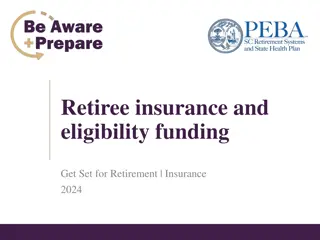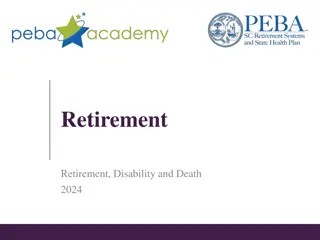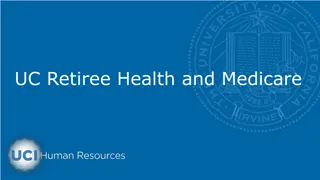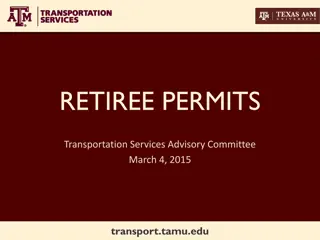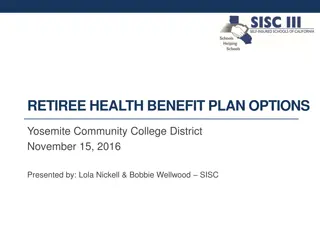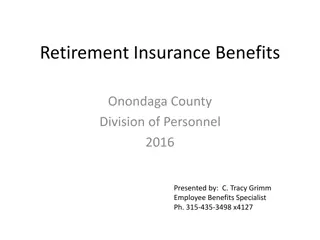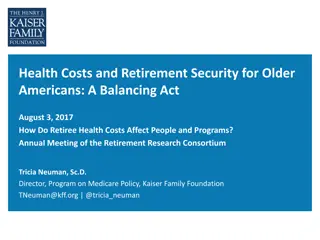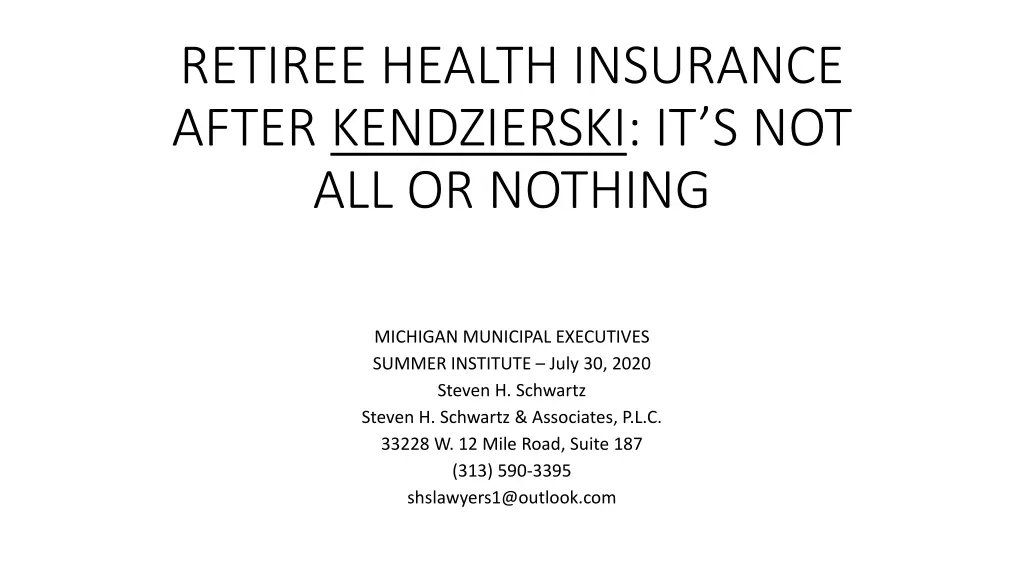
Understanding Retiree Health Insurance Implications in Michigan
Explore the aftermath of the Kendzierski case in Michigan, detailing the impact on retiree health insurance, employer rights, and unions' demands. Learn why retiree health insurance matters for public employees, including future liabilities, financial considerations, and legal implications.
Download Presentation

Please find below an Image/Link to download the presentation.
The content on the website is provided AS IS for your information and personal use only. It may not be sold, licensed, or shared on other websites without obtaining consent from the author. If you encounter any issues during the download, it is possible that the publisher has removed the file from their server.
You are allowed to download the files provided on this website for personal or commercial use, subject to the condition that they are used lawfully. All files are the property of their respective owners.
The content on the website is provided AS IS for your information and personal use only. It may not be sold, licensed, or shared on other websites without obtaining consent from the author.
E N D
Presentation Transcript
RETIREE HEALTH INSURANCE AFTER KENDZIERSKI: IT S NOT ALL OR NOTHING MICHIGAN MUNICIPAL EXECUTIVES SUMMER INSTITUTE July 30, 2020 Steven H. Schwartz Steven H. Schwartz & Associates, P.L.C. 33228 W. 12 Mile Road, Suite 187 (313) 590-3395 shslawyers1@outlook.com
MICHIGAN SUPREME COURT: KENDZIERSKI v. MACOMB COUNTY Before decision: Unsettled law in both public and private sector can the employer unilaterally change retiree health insurance benefits? Settled law: Unions do not represent retirees in subsequent collective bargaining Settled law: Retiree health insurance is not a right protected by the Michigan Constitution Kendzierski case: Macomb County unilaterally changed prescription drug benefits for retirees formerly represented by AFSCME Ruling: Contractual right to retiree benefits expires with expiration of the collective bargaining agreement unless there is express language that retiree health insurance is a vested lifetime benefit
IMPACT OF KENDZIERSKI DECISION In many situations, public employees may unilaterally modify retiree health insurance benefits (requires careful review of all collective bargaining agreements) Unions are demanding express contract language that retiree health insurance be a lifetime vested right Majority of current, active employees were not offered retiree health insurance when they were hired Public employers are not rushing to eliminate or modify the retiree health insurance now provided to existing retirees Michigan Court of Appeals, in a limited number of cases, has had mixed rulings on the right of public employers to modify retiree health insurance, after Kendzierski
WHY RETIREE HEALTH INSURANCE MATTERS Future liability that will continue for 30 50 years Uncontrollable cost/based solely on health insurance premiums and claims Directly affects bond rating/interest rates for borrowing Reduces ability to pay for active employee staffing or capital projects Reduces ability to pay wage increases for active employees Requires annual actuarial report Requires P.A. 202 corrective plan for certain underfunding metrics
PRACTICAL CONSIDERATIONS TO ELIMINATING/REDUCING RETIREE BENEFITS Difficulty in explaining scope of the problem to elected officials How many retirees live in the community? Do influential retirees live in the community? Select the appropriate timing to make a change/need correct economic environment Are retirees now elected officials?
ALTERNATIVES TO THE MEAT-AX APPROACH Verify the accuracy of the underlying data used by the actuaries * Are the actuarial assumptions reasonable? Change the carrier, but maintain identical benefits * Mirroring retiree health insurance to future changes in collective bargaining agreements * Pay a stipend for waiver of retiree health insurance * Seek voluntary changes, on an individual basis, for the level of benefits *
ALTERNATIVES TO THE MEATAX APPROACH - CONTINUED Change the benefits and reimburse directly to the retiree (self-insure) Change the benefits and put $ in an IRS-approved account for retiree health insurance Evaluate providing Medical Advantage Plans instead of older Medicare Supplemental Plans Evaluate options on plan design with insurance agent Payment to waive coverage and move retiree to spousal coverage Design plan so that Social Security is primary carrier, not municipal plan
ALTERNATIVES TO PAY AS YOU GO Adopt a policy allocate given amount of dollars to OPEB liability Adopt a policy allocate excess fund balance to OPEB liability Allocate found money to OPEB liability Favorable tax tribunal settlement Property tax growth from new development Property tax growth when tax incentives expire Line items freed up when existing debt expire Settlement of disciplinary discharge employee waives right to claim retiree health insurance
COLLECTIVE BARGAINING ISSUES Is retiree health insurance replaced with health savings accounts for Tier 2 employees? Is sufficient money being put away for Tier 2 employees with health savings accounts? How many Tier 1 employees are left is it enough to make a difference? Unions will demand express language demanding vested, lifetime benefit Potential Act 312 issue
ASSUMING A COVID RECESSION: SHOULD RETIREE HEALTH INSURANCE BE CONSIDERED? (1) will a COVID recession cause property values to drop? 24-month time lag between assessments and effect on tax base (2) will small business failures reduce commercial property tax revenue? (3) will the Legislature cut state-shared revenue? (4) will Congress bail out local governments? (5) will the recession affect other sources of municipal income (interest income, user fees, building permits)? (6) when does economic recovery start?
CONCLUSION There is no once size fits all for every community Evaluate the numbers and the actuarial trends Is the money going to be spent on current retirees or future retirees? Careful analysis of collective bargaining agreements is required before making a change What is the appropriate change to make (or is status quo appropriate)? When is the appropriate time to make a change? How can support from elected officials be obtained? education and timing





